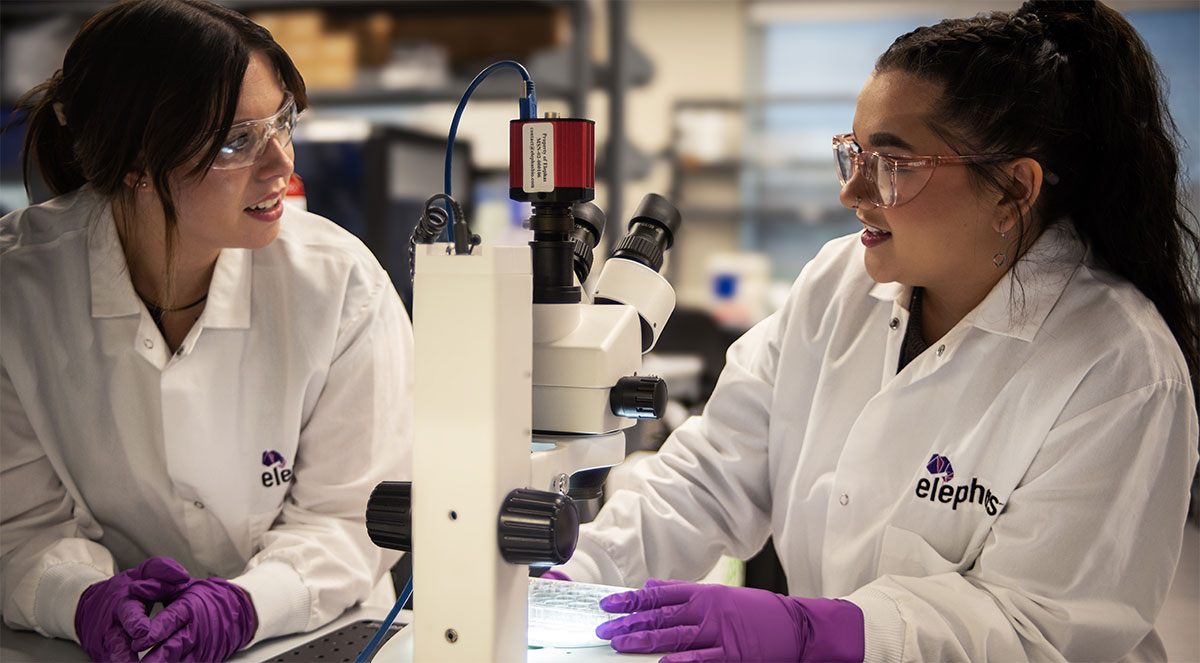An adult elephant has the body mass of about 100 human beings. Despite their enormous size, these remarkable creatures defy the odds by almost never getting cancer.
This paradox is still a mystery to scientists. It’s also a source of inspiration for a promising new Wisconsin spinoff company, Elephas Biosciences, which has created a platform to predict whether patients will respond successfully to cancer immunotherapy.

Elephas was born in 2020 with major influences from bioimaging advances at the University of Wisconsin–Madison and the Morgridge Institute for Research. Morgridge Investigator Kevin Eliceiri, a UW–Madison professor of medical physics and biomedical engineering, has been working closely with Elephas leaders to help bring this promising new technology to fruition.
Immunotherapy treatments — essentially powering the body’s own immune system to fight cancer — are the newest wave of cancer treatment and are generating great hope. More than 70 immunotherapy drugs are now in the clinical pipeline with more than 1,000 clinical trials nationally.
The National Cancer Institute estimates that about 20 percent of all immunotherapy treatments result in fully treating cancer. That means many people can go through months of treatment before they know whether it will work. The uncertainty also means that some patients who might be ideal candidates for immunotherapy do not get recruited.
Elephas is working to change that dynamic by testing drugs within “tumors in a dish” from a patients’ own biopsy and predicting which candidates will have the best odds of success. A key aspect of this testing is using label free, non-invasive imaging modalities that can help determine cell state and viability without adverse effects on downstream drug testing.
“The problem is we’re spending hundreds of millions of dollars on these great therapies, but there are no tools to guide decisions on who will benefit most,” says Maneesh Arora, founder and CEO of Elephas. “And with all these immunotherapies coming to market, that is the big opportunity for Elephas.”
The company completed some major milestones in 2024, including:
- A clinical partnership with Mayo Clinic in Rochester, Minn. This will allow a long-term study of whether patients’ actual clinical responses to immunotherapies match the predictions that were created by the Elephas platform.
- A big infusion of investment capital. Elephas received $55 million in its most recent round of capitalization in December 2023 led by the Venture Investors Health Fund and the State of Wisconsin Investment Board (SWIB).
- Employee growth. Elephas now has more than 90 employees on Madison’s near west side and has ramped up its testing through relationships with 13 different clinical sites around the country. They are receiving as many as a dozen live biopsies a week for testing.

“If we can tell clinicians in 72 hours what actually will happen (during treatment) three to six months later, that will be an incredibly pivotal moment and the single goal of everyone at our company,” Arora says. “It’s proving the platform can predict response to immunotherapy from a live tumor biopsy.”
The technology behind Elephas uses live tissue from biopsies to preserve the complex tumor microenvironment in which cancer grows. This enables clinicians to look at how the variety of different cells — tumor cells, noncancerous cells, and immune cells — coordinate to either promote or suppress tumor growth. And they can measure the natural contrast generated by cell metabolism to determine how the microenvironment is responding to different drugs.
“The big challenge for us in harmonizing the biology, the engineering, the imaging and the software to deliver a single solution,” says Arora. “All of these things need to come together.”
Eliceiri says the Elephas story is a great example of how UW–Madison scientists and companies can work together. Ideas flowed through numerous informal discussions, and different expertise was tapped as questions arose. New collaborations are being explored, including with Morgridge biomedical engineering PI Melissa Skala.
“Having that direct interaction between companies and professors without layers is really important,” Eliceiri says.
Elephas is part of a growing biotechnology startup company culture in Madison and is a direct beneficiary of the successful paths paved by others. One perfect example is Third Wave Technologies, a company that celebrated the 30th anniversary of its founding in December 2024.
In the early 2000s, Arora was an executive of Third Wave, a molecular diagnostics company that developed products for cervical cancer screening. That technology emerged from the labs of UW–Madison biomolecular chemistry professor James Dahlberg (also a member of the Morgridge Board of Trustees) and chemistry professor Lloyd Smith. Third Wave was purchased in 2008 by Hologic Inc. for roughly $600 million.
Third Wave produced another major success story. Its former CEO Kevin Conroy is now CEO of Exact Sciences, one of the biggest household-name biotech companies in Wisconsin that specializes in tools for the early detection of cancer.
And Third Wave was the Wisconsin Alumni Research Foundation’s (WARF) very first foray into taking equity stake in a company, something they do commonly today (and have done so with Elephas). That full-circle impact is on full display today.
“Third Wave raised unprecedented amounts of venture capital for the times and played a significant role in the growth of venture capital availability in Wisconsin,” says Jenni Le, principal of Venture Investors Health Fund. “They were the first biotech company to go public in Madison, forever altering the perception of Madison as a place to work and start a company.”
